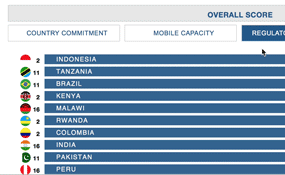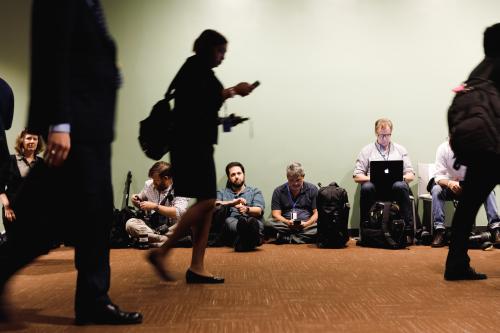On August 26, the Brookings Institution hosted a panel discussion of the findings of the 2015 Financial and Digital Inclusion Project Report and Scorecard. Chief among the report’s findings was the rapid growth of financial products and services targeted at the world’s unbanked population. Much of the growth stems from innovations in digital payments systems and non-bank financial services. For example, systems like M-Pesa in Kenya allow customers to store money on their mobile phones and easily transfer it to other M-Pesa users. Advancing financial inclusion will greatly benefit the two billion people worldwide that still lack access to any financial services.
The report itself ranks a set of 21 countries on four continents chosen for their efforts to promote financial inclusion. The criteria used to score each country include country commitment, mobile capacity, regulatory environment, and adoption. The results show that several pathways to financial inclusion exist, from mobile payments systems to so-called “branchless” banking services. Places that lack traditional banks have seen financial inclusion driven by mobile operators, while others have experimented with third-party agent banking in areas that lack bank branches.
##1##
The panel drew financial inclusion and mobile payments experts from the government, industry, and non-profit groups. Each panelist touted the benefits of financial inclusion from their own perspective. Women especially have much to gain from financial inclusion since they have historically faced the most obstacles to opening financial accounts. In developing countries, a mobile payments system grants women greater privacy, control, and safety compared to cash payments. Traceable digital payments also make it easier to combat corruption and money laundering. Salaries paid to government employees and transfer payments to low-income households can be sent straight to a mobile payment account, eliminating opportunities for bribe seeking and theft.
According to the panelists, financial inclusion can also drive economic growth in developing countries. As financial services expand, they will also increase in sophistication, allowing customers to do more with their money. For example, a payments record can be used to establish a credit history for loan applications, and digital savings accounts with interest can help customers protect their wealth against inflation. These same systems can also be used to provide insurance coverage, reducing financial uncertainty for low-income populations.
Infographic
The 2015 Brookings Financial and Digital Inclusion Project Scorecard
August 2015
The proliferation of financial services has many benefits, but it will also create policy challenges if regulations do not keep up with financial innovation. Requiring several forms of identification to purchase a mobile phone or open a bank account presents an obstacle to low income and rural customers that live far away from government offices that issue identification. Broad coordination between telecom regulators, ID issuers, banking authorities, and other government agencies is often necessary for lowering barriers to accessing financial services.
It is telling that many countries included in the report are looking to other developing countries for policies to promote financial inclusion. The scarcity of traditional banks combined with new methods of accessing financial services opens avenues to financial inclusion not seen in most developed countries. Established banking industries and the accompanying regulations leave fewer opportunities for financial innovation, but countries with large unbanked populations can start with a clean slate. Over the next two years, FDIP will continue to monitor and report on developments in financial inclusion around the world.
Send comments on the
2015 FDIP Report and Scorecard
and suggestions for future reporting to
[email protected]
.
The Brookings Institution is committed to quality, independence, and impact.
We are supported by a diverse array of funders. In line with our values and policies, each Brookings publication represents the sole views of its author(s).



Commentary
Financial inclusion panel highlights expanding services for the world’s unbanked
August 31, 2015